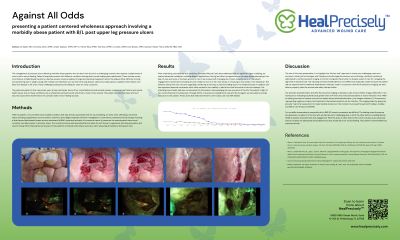Case Series/Study
(CS-134) Against All Odds, presenting a patient centered wholeness approach involving a Morbidly Obese patient with B/L Post upper leg pressure ulcers

The management of pressure ulcers affecting morbidly obese patients who are bed-chair bound is a challenging scenario that requires (‘a broad-based approach’/’multiple levels of care’) to aid in wound healing. Patients frequently present with different conditions slowing their wound healing down significantly. These include urinary incontinence, Irritable Bowel Syndrome, Diarrhea, excess moisture leading to fungal and bacterial overgrowth within the adipose folds, difficulty moving and positioning due to weight, along with a leu of internal medicine conditions such as Restrictive lung disease, Obstructive sleep apnea, Congestive heart failure, and fatty liver disease to list a few. These challenges prolong wound healing for years on many occasions.
Methods:
With this patient, we controlled every possible condition that was directly associated with her wound healing. To name a few: Offloading, Nutritional Status including supplements (protein/vitamin D, collagen peptides), Infection Management, Incontinence, Advanced Wound Therapy including a dual-layered dehydrated human amnion membrane (dHAM) comprised primarily of connective tissue. It preserves the natural growth factors and cytokines normally present in amniotic tissue. The connective tissue and associated factors allow the soft tissue to regenerate, promote granulation and wound closing. Most importantly we focused on the patient’s emotional well-being to provide a calm reassuring atmosphere during each visit.
Results:
After underlying co-morbidities and conditions (Standard Wound Care) were addressed with no significant signs of healing; we started advanced modalities including the allograft applications and after these ulcers have been here for over 5 years they are now healed.
Discussion: The aim of this case presentation is to highlight the “kitchen sink” approach in these very challenging cases and scenarios. Morbidly obese patients, especially with a BMI >50, simple movements are difficult. The healing rates of pressure Injuries/ulcers in patients of this size who are bed bound is challenging due to all of the other factors including Mental Health & patient empowerment and engagement. With the array of other factors that come into play, as an advanced wound company we addressed all possible factors that would aid in her wound healing. The patient’s mental health is much improved as well.

.jpeg)